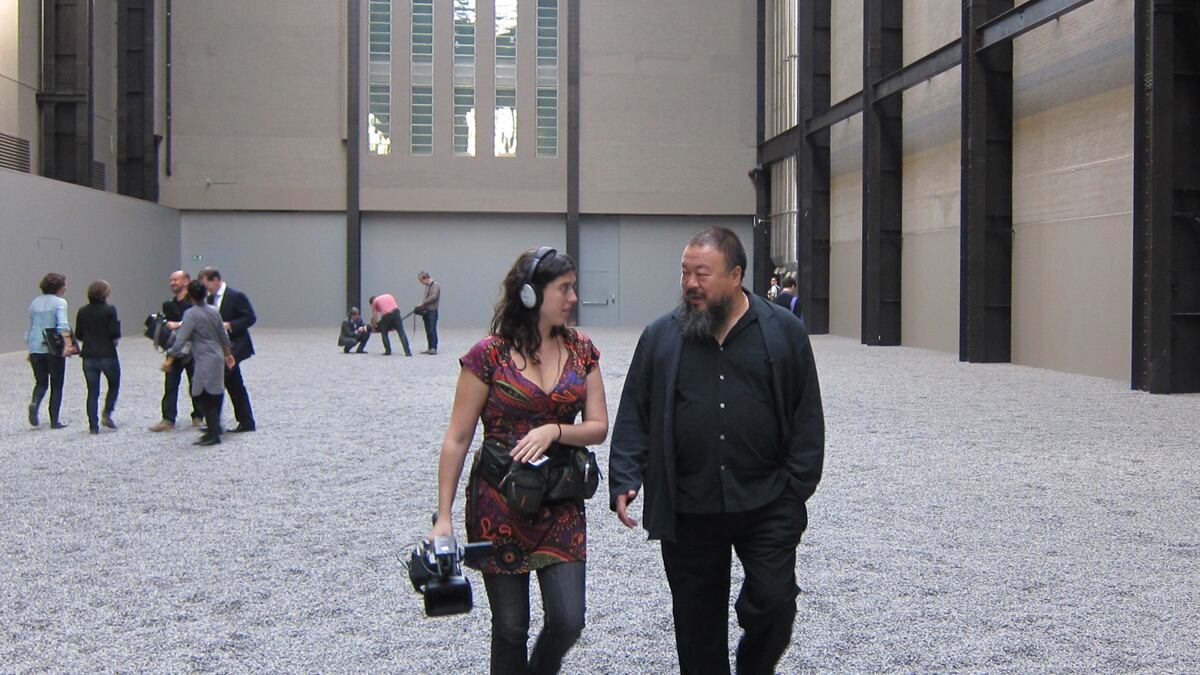Known for their smug brutality, police in China do not, as a matter of course, get interrogated—especially not by the people whom they beat and harass. Yet there’s a remarkable scene in Alison Klayman’s new documentary Ai Weiwei: Never Sorry in which Ai, the Chinese artist-turned-dissident walks into a Chengdu police station, trailed by his camera-wielding entourage and demands an investigation into his assault months earlier by the city’s police force. Surprised, the officers respond by taking out their own cameras, as the scene turns into a tense face-off that serves as a metaphor for the artist’s harrowing four-year battle against the Chinese state.
The film, which opens in the U.S. on Friday, is a riveting look at Chinese tyranny and the people who fight back. For 90 minutes, first-time director Klayman, 27, captures Ai’s evolution from China’s most famous creative force, and a man who helped design the 2008 Beijing Olympic stadium, into a dissident gladiator facing off against the power of the state.
For all foreign journalists in China, the government can be an unpredictable and potentially violent force. Confronting it wasn’t what Klayman had in mind when she moved to China in 2006, having just graduated from Brown University with little knowledge of Mandarin and only vague notions of becoming a journalist.
Two years later, however, having become fluent in the language and savvy about Chinese culture, Klayman began filming Ai almost by accident. It started as a short film project suggested by her roommate, who was working for a Beijing art gallery exhibiting Ai’s photography. Her plan was to tag along with Ai and see what she could make out of the footage.
As the 2008 Beijing Olympics approached, Ai began to publicly reject the regime’s propaganda. Klayman followed him to Sichuan as he launched a personal investigation into the cover-up of the thousands of children who died in a major earthquake in May 2008, when the region’s poorly constructed schools collapsed. Ai’s profile subsequently soared, attracting both Western acclaim and the wrath of the Chinese government, which unleashed a campaign of intimidation against him, culminating in the artist’s three-month detention and provisional release last year.
Klayman, too, worried about her physical safety. Still, she pressed on with the project. “Being around [Ai] makes you feel bolder,” she said, recalling the many confrontations with security agents she documented on film. “The overwhelming thing was to be really scared, because your primary concern when dealing with subjects in China is that you’re not getting anyone into trouble.”
Ai seems to revel in challenging the regime, but the film shows his life outside of being a dissident. He pets cats, smashes ancient urns, and creates soaring installations in London and Berlin. He brings the same graceful charm to his daily life that he does to his frightening encounters with the Chinese government.
This is no hagiography, however. The film, for instance, doesn’t shy away from the fact that Ai’s son is the result of an extramarital affair. Instead, Ai is depicted as a complex man leading a complex life, both as an artist and as a dissident.
“It really tells what's happening in this land,” Ai says of the film. “There is no exaggeration." Beyond his on-screen participation, Ai gave Klayman free rein on the film and is not profiting from it.
When Klayman turns the camera to Ai’s activism, she focuses on his deft use of social media, first on a Chinese blog and then—when after the censors blocked it—on Twitter, through which Ai attracts ordinary Chinese to his search for justice and transparency.
In the process, Klayman also dissolves the longstanding myth, perpetuated by the government, that Ai is a Western stooge, someone who is not actually popular in China. In scene after scene, average Chinese come out of the woodwork to help with his investigation, shake his hand, and rally around his studio when the government demolishes it. These are people lacking political protection and with much to lose. Yet they do it anyway.
“What you get is that the Chinese don’t have to be exposed to the international avant-garde to care about freedom of expression and rule of law,” said Klayman. “There’s a lot more diversity of opinion and courage in China that Westerners might expect.”

Klayman spent the last two years shuttling between the U.S. and China to edit the film, find funding, and obtain more footage. Despite Ai’s growing profile, it wasn’t easy. “I ran into obstacles," she said. “Some companies and individuals with interests in China just refused to touch it."
Fortunately, she secured enough money to finish the film. Earlier this year it premiered at the Sundance Film Festival in Utah, where it won a special jury prize for its “spirit of defiance.”
Despite rave reviews in America, Klayman knows that there is no chance the film will come to theaters in China. Still, she has some hope that those who want to see it will be able to snag a copy, even if they don’t buy a ticket.
“I can’t wait,” she said, “to see it in the bootleg DVD shops.”






